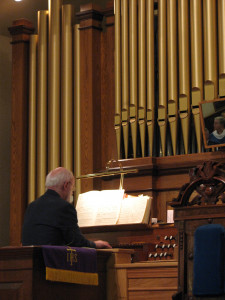This coming Sunday, June 25th our Conference’s Associate Minister, the Rev. Pam Lucas, will be filling our pulpit. She will be preaching on our tendency to exclude while God’s heart yearns for inclusion. Her sermon, “Hagar’s Story” will turn our focus to the scripture reading of Genesis 21: 8-21 and to the hymn “I Love My God, Who Heard My Cry.”
This hymn, setting Isaac Watts’ text from Psalm 116 to a popular African-American spiritual, can be previewed at https://www.youtube.com/watch?v=BdH9tVor7WU&index=2&list=RDeubsBeZS79k . It’s an example of the contemporary gospel sound that arranger Richard Smallwood helped pioneer and was recorded by many such as Whitney Houston in the heartwarming movie, “The Preacher’s Wife.”
The cover photo on the bulletin will be the painting “Beer-lahai-roi,” by Marcia Tomlinson, depicting Hagar at the “spring of water in the wilderness,” where the Lord found her. Beer-lahai-roi means “well of the Living One who sees me.”
The introit this week, “Let Us With a Joyful Mind,” takes as its text the stirring paraphrasing of Psalm 136 by John Milton. Our corporate hymns this Sunday follow along with Rev. Lucas’ focus of inclusion. “God Made from One Blood” is set to the familiar Welsh tune of “Immortal, Invisible, God Only Wise” and celebrates the many different kinds of families gathering to worship. New to our fellowship is the delightful “God of Change and Glory” as it has us proclaim diversity as a gift from God. Finally, set to the tune of Charles Wesley’s “O for a Thousand Tongues,” are the envisioning words of Miriam Therese Winter … “O for a world where everyone respects each other’s ways …”
Back at the console this Sunday, Organist John Atwood will be presenting three pieces by N. deGrigny, a French composer who was at Reims. The first piece is a fugue with five parts which some believe is the epitome of fugue writing in France. The offertory is an introspective piece with melody in the tenor and very Italian, full of improvisation and ornaments–even some of the ornaments are ornamented! The Postlude is a freely written and much more loud piece (Dialogue sur les Grands Jeux). Johann Bach transcribed some of deGrigny’s works around 1710-1715 which means that he thought a lot of deGrigny’s compositions.

